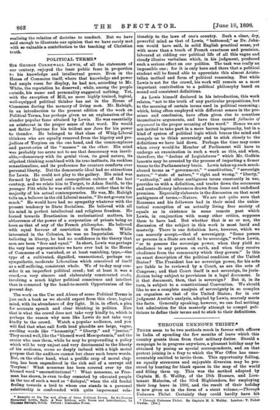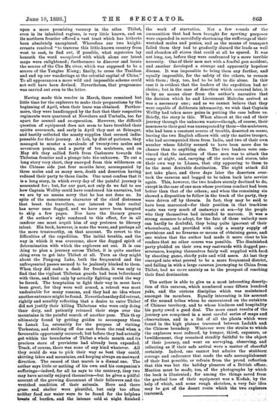THROUGH UNKNOWN THIBET.*
THERE seem to be two methods much in favour with officers in India of spending the few months of leave which this country grants them from their military duties. Should a campaign be in progress anywhere, a pleasant holiday may be obtained by posing as special correspondents, and on that pretext joining in a fray to which the War Office has unac- countably omitted to invite them. This opportunity failing, an equally strenuous and enjoyable diversion may be pro- cured by hunting for blank spaces in the map of the world and filling them up. This was the method adopted by Captain M. S. Wellby, of the 18th Hussars, and Lieu- tenant Malcolm, of the 93rd Highlanders, for employing their long leave in 1896, and the result of their holiday is now given us in the form of a stout volume,—Througli Unknown Thibet. Certainly they could hardly have hit • Throve); Unknown Thdiet, By Captain M. S. Wellby. London: T. Fisher IInwia [Sle.] upon a more promising vacancy in the atlas. Thibet, even in its inhabited regions, is very little known, and on its northern frontier offered a vast tract which has hitherto been absolutely unexplored. Wherefore our two knight. errants resolved "to traverse this little-known country from west to east, to find out, if possible, what mysteries lay beneath the word unexplored with which alone our latest maps were enlightened ; furthermore to discover and locate the source of the Chu Ma river, which was supposed to be a source of the Yangtse Kiang; finally, to cross the Tsaidam and end up our wanderings at the celestial capital of China." To all appearances a more wild and impossible scheme could not well have been devised. Nevertheless, that programme was carried out even to the letter.
Having made this resolve in March, there remained but little time for the explorers to make their preparations by the beginning of April, when their leave was obtained. Further- more, they were handicapped by the fact that their respective regiments were quartered at Nowshera and Umballa, too far apart for council and co-operation. However, the difficult question of equipment does not seem to have troubled their spirits overmuch, and early in April they met at Srinagar, and hastily collected the scanty supplies that seemed indis- pensable for their journey. At Leh, by dint of patience, they managed to muster a cavalcade of twenty-two mules and seventeen ponies, and a party of ten muleteers, and on May 4th they sallied forth from Cashmere towards the Thibetan frontier and a plunge into the unknown. To cut a long story very short, they emerged from this wilderness on the Chinese side just four months later, accompanied by three mules and as many men, death and desertion having reduced their party to those limits. One must confess that it is a long story, in which every day of the painful journey is accounted for ; but, for our part, not only do we fail to see how Captain Wellby could have condensed his narrative, but we are by no means sorry that he has not done so. In spite of the monotonous character of the chief distresses that beset the travellers, our interest in their recital has never once flagged, and we have never been tempted to skip a few pages. Nor have the literary graces A the author's style conduced to this effect, for in all candour one must acquit him of any pretence to literary talent. His book, however, is none the worse, and perhaps all the more trustworthy, on that account. To revert to the difficulties of the expedition. The initial trouble, and the way in which it was overcome, show the dogged spirit of determination with which the explorers set out. It is one thing to plan a journey across Thibet, it is quite another Ching even to get into Thibet at all. Turn as they might about the Pangong Lake, both the frequented and the unfrequented passes seemed to be jealously blocked to them. When they did make a dash for freedom, it was only to find that the vigilant Thibetan guards had been beforehand with them, and that only by actually fighting could the way be forced. The temptation to fight their way in must have been great, for they were well armed, a retreat was most undesirable for many reasons, and they had no idea where another entrance might be found. Nevertheless they did retreat, rightly and sensibly reflecting that a desire to enter Thibet did not justify their killing Thibetans who were only doing their duty, and patiently retraced their steps over the mountains in the painful search of another pass. This they ultimately found by getting guides to accompany them to Lanak La, ostensibly for the purpose of visiting Turkestan, and striking off due east from the road when a favourable opportunity occurred; but before they had actually got within the boundaries of Thibet a whole month and its precious store of provisions had already been expended. Track, of course, there was none of any kind whatever. All they oould do was to pick their way as best they could, skirting lakes and mountains, and keeping always an eastward direction. The record of that march is a dismal one. The author says little or nothing of his own and his companion's sufferings—indeed, for all he says to the contrary, they two may have actually enjoyed themselves—but he gives a pitiful account of the growing discontent of their followers and the wretched condition of their animals. Here and there grass and shelter were plentiful, but only too often neither food nor water were to be found for the helpless laaalta of burden, and the intense cold at night finished the work of starvation. Not a few rounds of the ammunition that had been brought for sporting purposes were expended in mercifully shortening the sufferings of their wretched mules and ponies, and as the means of transport failed them they had to gradually discard the loads as well and abandon all stores that could at all be spared. It was not long, too, before they were confronted by a more terrible necessity. One of their men met with a fearful gun accident, and another developed a strange and apparently hopeless disease. It was impossible to bring them any further, and equally impossible, for the safety of the others, to remain with them ; they, too, had to be left to die alone. In thin case it is evident that the leaders of the expedition had no choice ; but in the case of desertion which occurred later, it is by no means clear from the author's narrative that the decision which he and Lieutenant Malcolm arrived at was a necessary one ; and as we cannot believe that they were capable of deliberate inhumanity, we wish that Captain Wellby had taken more pains in putting the case before us. Briefly, the story is this. When almost at the end of their journey through the unknown waste—though, of course, their nearness to their goal was unsuspected by them—the muleteers, who had been a constant source of trouble, deserted en masse, leaving the two English officers with only the native trooper, who had accompanied them from India, and two of their own number whose fidelity seemed to have been more due to chance than to anything else. The two leaders were con- vinced that the intention of these men was to attack the camp at night, and, carrying off the mules and stores, take their own way to Lhassa, that city appearing to them to be the most desirable destination. The night attack did not take place, and three days later the deserters over- took the caravan and begged to be taken back into service again. This, however, the two leaders sternly declined to do, except in the case of one man whose previous conduct had been better than that of the others ; and when the remaining sin showed a disposition to follow in the track of the party, they were driven off by threats. In fact, they may be said to have been marooned—for their position in that trackless. waste was very much of castaways at sea—by the people who they themselves had intended to maroon. It was a. strong measure to adopt, for the fate of these unlucky men can hardly be doubtful, they being quite ignorant of their whereabouts, and provided with only a scanty supply of provisions and no firearms or means of obtaining game, and one wishes that the author had made it more clear to his• readers that no other course was possible. The diminished. party plodded on their own way eastwards with dogged per- severance, keeping themselves fairly well supplied with food. by shooting game, chiefly yaks and wild asses. At last they emerged into what proved to be a more frequented district,. and falling in with a large caravan journeying to China from Thibet, had no more anxiety as to the prospect of reaching their final destination.
The author is able to give us a most interesting descrip- tion of this caravan, which numbered some fifteen hundred yaks, and the curious discipline which was maintained amongst its members. Equally interesting is his account. of the nomad tribes whom he encountered on the outskirts of Chinese territory, and to whose kindness and hospitality his party owed a good deal. The more exact results of the journey are comprised in a most careful series of maps and observations, and in a list of all the plants which were found in the high plateau traversed between Ladakh and the Chinese boundary. Whatever were the straits to which I he explorers were reduced, by hunger, thirst, exposure, or bewilderment, they remained steadily faithful to the object of their journey, and went on surveying, observing, and collecting as if their safe arrival were a matter of cheerfuT certainty. Indeed, one cannot but admire the stubborn courage and endurance that made the safe accomplishment of their feat possible, or refrain from the proud reflection that this was but the holiday pleasure of a. British officer. Mention must be made, too, of the photographs by which the book is illustrated; for among the things saved from the gradual loss of their equipment was a Kodak, by the help of which, and some rough sketches, a very fair idea may be got of the desert route which the two explorers traversed.



































 Previous page
Previous page